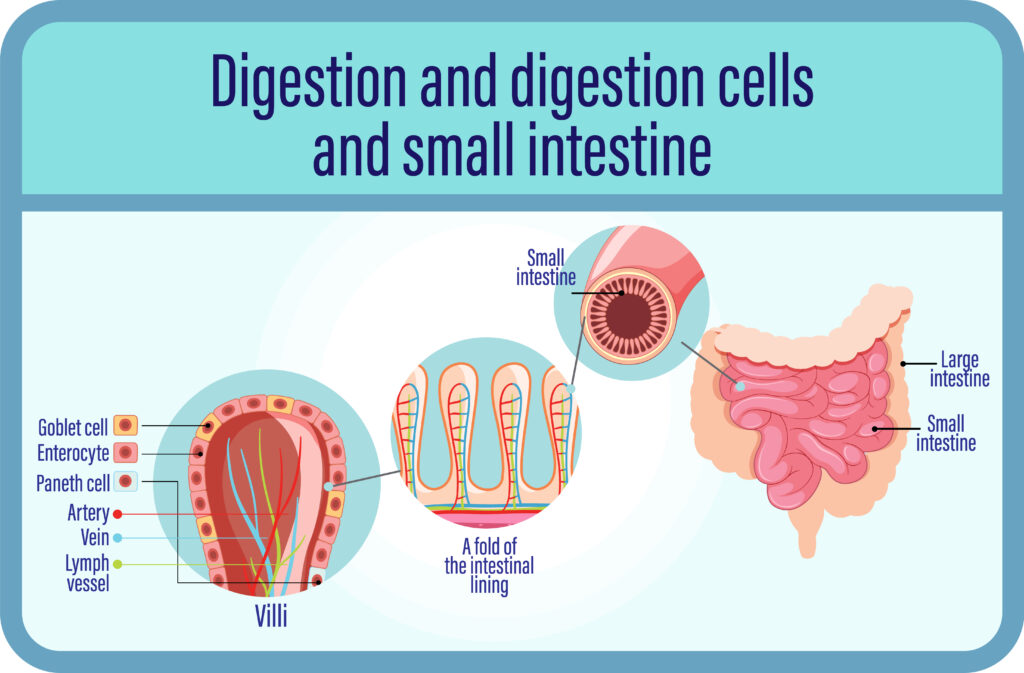Many people are curious about whether SIBO (Small Intestinal Bacterial Overgrowth) could have long-term effects on gut health. As awareness of digestive health grows, concerns about SIBO’s impact are common. This condition is often linked to symptoms like bloating, discomfort, and more, but how does it actually affect the gut lining? Can it cause lasting damage? In this article, we’ll take a closer look at the relationship between SIBO and gut health, how to identify its signs, and the steps you can take to support recovery.
The Gut Lining Explained:
The gut lining, or ‘gastrointestinal wall’, is crucial for overall health—it acts as a barrier between the external world (inside your gut) and your bloodstream. It plays an essential role in controlling what passes through to your body, including nutrients and immune-related particles (source).
Structure and Importance
It includes multiple different layer, each with a different function. The one closest to the food itself is the mucus layer, which helps with nutrient absorption (mainly in the small intestine) and helps protect your immune system from harmful invaders in the colon (source). The second layer is the epithelial barrier, made up of tightly sealed epithelial cells that keep bacteria and toxins out. Under healthy conditions, this barrier is sterile and sealed by different kinds of junctions like tight and gap junctions. These cells also help regulate the movement of nutrientsand water, whereas immune cells help keep your gut healthy. The third layer, the vascular barrier, controls what enters your bloodstream and ultimately your liver. If any part of this complex barrier system gets damaged, it can lead to widespread inflammation and serious metabolic issues (source).

How SIBO Impacts the Gut Lining
SIBO can significantly affect the gut lining, primarily through inflammation. When bacteria overgrow in the small intestine, they can produce harmful substances that irritate the gut lining, causing inflammation. This inflammation may lead to a condition known as Leaky Gut Syndrome, where the tight junctions in the gut lining become damaged, allowing toxins, bacteria, and partially digested food particles to “leak” into the bloodstream. Basically, the tight security system of the gut lining develops ‘holes’ and starts to look like a fence. Additionally, SIBO can cause nutrient malabsorption, which weakens the gut lining further and worsens the holes in the barrier.
Leaky gut syndrome isn’t an official medical diagnosis. It’s a way to describe a group of symptoms thought to be linked to a weakened intestinal lining that lets larger particles pass through.

Symptoms of Gut Lining Damage Related to SIBO
Damage to the gut lining can lead to a variety of symptoms, some of which overlap with general SIBO symptoms:
-
- Digestive Symptoms: These include bloating, diarrhea, and constipation—often made worse by foods that ferment in the gut.
-
- Systemic Symptoms: You may also experience fatigue, nutrient deficiencies, and even skin issues, as a compromised gut lining affects overall nutrient absorption and immune function. (source)
-
- Some of these symptoms may be overlapping with general SIBO symptoms, making it quite hard to tackle them, but there are definitely things you can do.
Healing the Gut Lining After SIBO
Healing the gut lining after battling SIBO is possible, though it takes time and strategic interventions:
-
- Dietary Strategies: Incorporate anti-inflammatory diet to reduce stress on the gut and promote healing. These dietary changes help reduce inflammation and encourage a balanced environment in the small intestine.
-
- Probiotics and Prebiotics: After addressing bacterial overgrowth, adding probiotics and prebiotics can help restore a healthy gut flora and support the repair of the gut lining.
The following strains work well for healing leaky gut:
-
- Lactobacillus (L.) acidophilus
- L. plantarum
- L. rhamnosus GG
- Bifidobacterium (B.) animalis lactis BB-12
- B. infantis
-
- Probiotics and Prebiotics: After addressing bacterial overgrowth, adding probiotics and prebiotics can help restore a healthy gut flora and support the repair of the gut lining.
-
- Supplements: Specific supplements, such as L-glutamine and zinc carnosine, are particularly beneficial for repairing the gut lining. Remember the different layers of the gut lining? L-glutamine supports mucosal regeneration in the mucosal layer, strenghtening that first layer (source), while zinc carnosine helps reduce inflammation.
-
- Lifestyle Adjustments: Stress management, adequate sleep, and regular exercise are all crucial for supporting gut health. Chronic stress, in particular, can weaken the gut lining, so incorporating relaxation techniques like yoga or meditation can be highly beneficial. (source)
Preventing Future Damage to the Gut Lining
Preventing further gut lining damage after SIBO treatment involves ongoing care and maintenance:
-
- Preventing Recurrence: Preventing SIBO recurrence is key. This may involve addressing underlying motility issues or other root causes of bacterial overgrowth.
-
- Balancing the Microbiome: A diverse diet rich in prebiotic fibers and fermented foods can help maintain a balanced microbiome, making it harder for harmful bacteria to overgrow.
-
- Long-term Dietary and Lifestyle Habits: Consuming a varied diet, staying hydrated, managing stress, and avoiding triggers (such as high-sugar or high-processed foods) can all help protect your gut lining long-term.
Conclusion
To sum it all up, SIBO can indeed contribute to gut lining damage through increased inflammation, bacterial toxins, and nutrient malabsorption. However, with the right steps, including targeted dietary changes, supplements, and lifestyle adjustments, it is possible to heal and maintain a healthy gut lining. If you suspect that SIBO is causing issues for your gut health, reach out to a healthcare professional for personalized guidance. Don’t let SIBO take control—take proactive steps to support your digestive health today!
